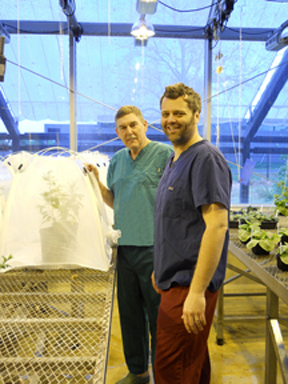Office of Research Helps Secure $4.5M Plant Pathology Grant
By Jocelyn Anderson

Bryce Falk (left) with postdoctoral scientist Jeremy Warren inside the UC Davis Biosafety 3P Contained Research Facility
(April 7, 2015) — Plant pathologist Bryce Falk and his research team scored $4.5 million for three years from the U.S. Department of Agriculture’s Specialty Crops Research Initiative to address citrus greening disease — and Falk credits much of the success to the special unit at the Office of Research that helped put together the application.
“We could not have gotten the proposal put together and funded without their help,” said Falk. “This service is a great thing for faculty.”
The Interdisciplinary Research Support team, which helped Falk, serves as a key partner to faculty members, aiding in the pursuit of major collaborative research initiatives. When developing a proposal, the group can facilitate team building, develop intellectual content outlines and conceptual diagrams, provide templates, format and edit documents, coordinate with the entire research team, advise on budget development and, in the end, make sure the finished product is professional and competitive.
In fact, these services have a proven track record. On average, the IRS team works on 19 major proposals annually, assisting approximately 200 faculty members from 70 departments and 12 divisions. The IRS team’s success rates regularly outperform the UC Davis and national average for NIH- and NSF funded grants (50 percent versus 18 to 22 percent).
“With our help, the faculty can focus their efforts on the scientific content — where their expertise lies,” said Bridget Gruber, research development analyst in the Interdisciplinary Research Support unit.
The grant, which allows for an additional two years for a total of $7.3 million in funding, is for research addressing the citrus greening disease Huanglongbing, spread by an insect called the Asian citrus psyllid.
The disease is ravaging citrus groves in Florida and threatening the entire industry on a global scale. According to Falk, more than 80 percent of the trees in Florida are infected, leading to a decrease in yield of 50 percent over the last 10 years and a loss of 15,000 jobs. In Brazil, intense management has meant the widespread use of insecticides.
So far, he added, the disease has yet to infect California. But it’s only a matter of time.
With the new research project, the team plans to attack the issue from two sides: the insect and the plant.
Falk’s team at UC Davis aims to find and engineer viruses that can induce negative traits in the insect, essentially preventing it from being able to transmit the bacterium.
Partners at UC Riverside and the University of Florida are working on a similar idea with plant viruses, again manipulating what happens when the psyllid feeds on the tree.
Findings from the research could help reduce the need for pesticides in citrus groves.
“What we are hoping is that between our plant virus-based approach and the insect virus-based approach, we will have at least the knowledge of what we might be able to do before it gets [out of control] — and before it gets into California. But even to help Florida.”
Another team at UC Berkeley is focused on outreach and education.
This grant is part of a larger effort by the USDA to find ways to combat this growing problem. The agency has committed $30 million to 22 different projects focused on the cause.
“We’re really trying to be ready for the future and to take new approaches that will hopefully, with all the other approaches, help control the disease,” said Falk. “It’s a huge problem. It’s a plant disease that could eliminate an industry.”
Additional information:
Share with:

